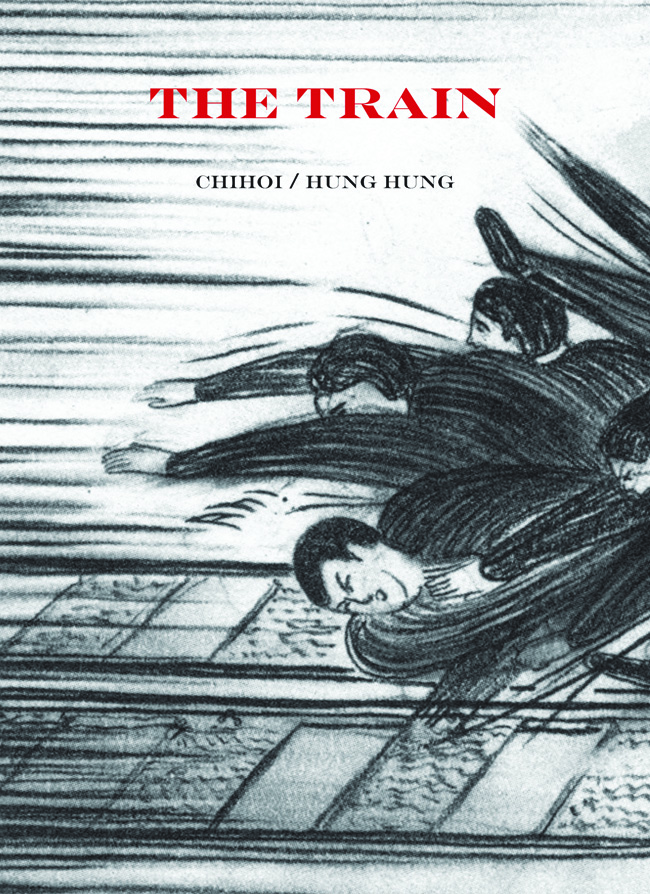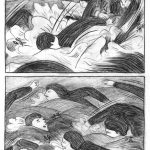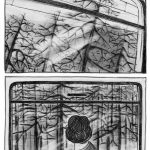In 2014, Conundrum Press, through their Conundrum International line, printed The Train, a collaborative comic based on Taiwanese poet Hung Hung’s award-winning serialized short fiction Wooden Horses. Originally published in 1998, this story was later adapted into a graphic novel in 2007 by Hong Kong-based artist Chihoi.
Unlike many comics adaptations, in The Train, the comic and the original text of Wooden Horses are compiled in the same print object. I bring this up because it gives readers the opportunity to see the liberties Chihoi made with Hung Hung’s original story without doing any further research. There are a few, and it’s an interesting formal exercise, although I found that the comic works fine without a broader understanding of its urtext.
In The Train, an unnamed passenger on a continuously moving train observes the world around him, interacts with other passengers, and contemplates the nature of the world outside of the limits of the train. Chihoi draws each page completely in graphite, and the ghosts of erased figures and lines still pop up from the page. Like many works in graphite, The Train has an ephemeral, smoky quality that serves its melancholy plot. The panelling is a simple 1×2 grid, mimicking the long windows of train cars.
The Train acts somewhat like a carousel – passengers move around in a circle, moving one way only to find out after a train car switch, that they’re moving back the way they came. The entire comic has a surreal dreamlike quality. In one striking scene, we see the main character climbing over a mountain of suitcases to get to the end of the train. A crowd of people blows in from the other end of the train, its people a writhing mass with arms and heads. The characters move like the ocean’s waves and at points appear to be swimming on dry land. Chihoi’s characters in motion blur together in speed lines as they attempt to make it onto the new car which is coupling with the one they’re on. But the main character realizes, in a fit of laughter, that despite their bustle, the other passengers are going nowhere fast.
Despite the dramatic flourishes, the story of The Train is remarkably simple – the unnamed protagonist contemplates the world outside of the train as he watches people drink coffee, read books, and surf the internet. He’s looking for someone, a woman, who is supposed to be getting on the train soon. Like the promise of getting off at the next stop, this mysterious lady never materializes.
Instead of using fill tones or chunkier graphite fill, Chihoi illustrates dark walls and suits thin line by thin line, stacked on top of each other. This effect adds a motion and pull to the images. Small touches show Chihoi’s mastery of the tools at play – things outside the windows of the train are slightly erased to show window glare, and much of the comic is shaded using smearing of those straight, dark lines. Chihoi’s illustration emphasizes the impotency of his characters and the futility they face; each is quiet, dead-eyed, almost half-alive.
This concept of futility seems to be the crux of The Train. In some ways, Chihoi seems to be making a commentary on life – the train cars being the limited perceptions of individuals, with the real world whizzing by, unable to be fully comprehended. Passengers can try to change, move from car to car, push and scream to get to the next place. But that effort is ultimately worthless, like trying to get off a carousel by switching the horse you ride on. Likewise, characters daydream about what it would be like to get off the train, to finally stop – but just because they daydream about it, doesn’t mean it’s ever going to happen. I can’t help but also think of the idea of The Train as a meditation on purgatory, either in the dogmatic or personal sense – characters always in waiting, not in action.
Sequential State is generously supported by readers on Patreon. If this reading experience was worth a dollar to you, I’m asking for your support. There are great reward tiers, including physical copies of my Selections criticism zine project mailed straight to your door. Thanks!




